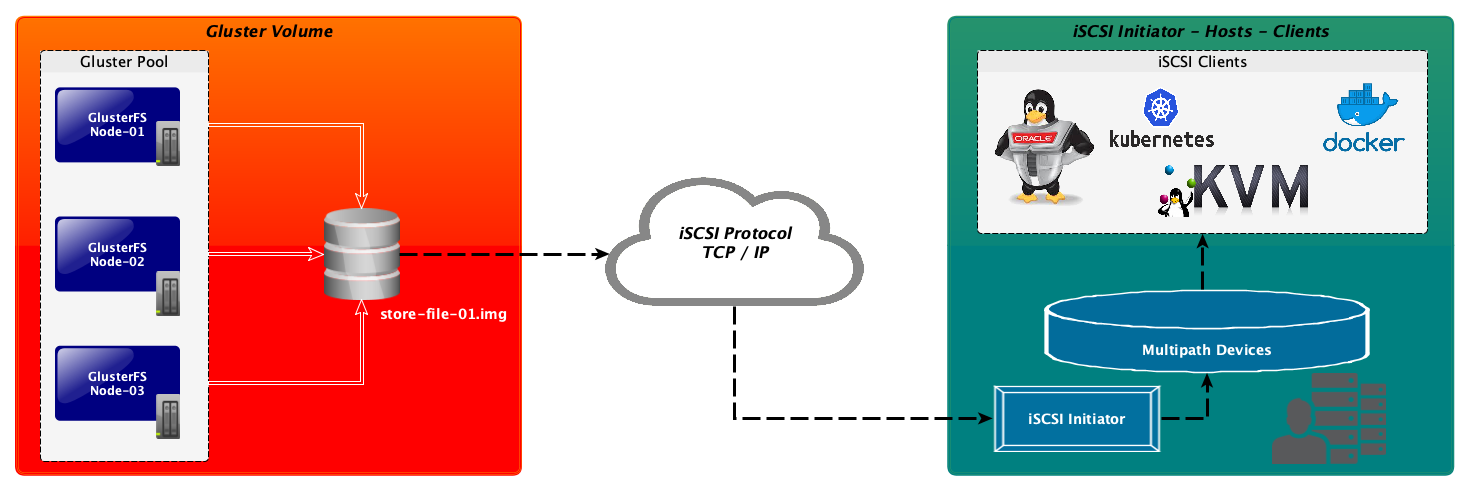 The Oracle Linux and Virtualization team is pleased to announce the release of Gluster Storage Release 5 for Oracle Linux 7, bringing customers higher performance, new storage capabilities and improved management.
The Oracle Linux and Virtualization team is pleased to announce the release of Gluster Storage Release 5 for Oracle Linux 7, bringing customers higher performance, new storage capabilities and improved management.
Gluster Storage is an open source, POSIX compatible file system capable of supporting thousands of clients while using commodity hardware. Gluster provides a scalable, distributed file system that aggregates disk storage resources from multiple servers into a single global namespace. Gluster provides built-in optimization for different workloads and can be accessed using an optimized Gluster FUSE client or standard protocols including SMB/CIFS. Gluster can be configured to enable both distribution and replication of content with quota support, snapshots, and bit-rot detection for self-healing.
New Features
Gluster Storage Release 5 introduces the support for the following new important capabilities:
- Gluster block storage: Gluster volumes can be set up as an iSCSI back-store to provide block storage using the gluster-block and tcmu-runner packages. Files on volumes are exported as block storage (iSCSI LUNs).
- Thanks to this new supported feature your Gluster cluster can act as an iSCSI storage for your development as well as production environments and grant an Enterprise Storage Level with a lower TCO

-
- For further details see “Chapter 4 Accessing Volumes” on “Gluster Storage for Oracle Linux User’s Guide”.
- Heketi scripted cluster automation: The heketi and heketi-client packages automate the management of a Gluster cluster. Trusted storage pools and volumes can be provisioned and managed using the heketi-cli command, and custom scripts can be written using the API functions exposed by the Heketi service. It is particularly useful for set-up steps during cloud-based deployments that can be automated without requiring manual systems administration. The introduction of Heketi API support opens Gluster as a real Storage-as-a-Service solution for your infrastructure.
- For further details see “Chapter 5 Automating Volume Lifecycle with Heketi” on “Gluster Storage for Oracle Linux User’s Guide”.
Further enhancement and new features in Gluster Storage Release 5 for Oracle Linux 7 are:
- Performance
- Network throughput usage increased up to 5 times
- Standalone
- Dentry serializer feature is now enabled by default
- Python code in Gluster packages is Python 3 ready
- Added noatime option in utime xlator
- Enabling the utime and ctime feature enables Gluster to maintain consistent change and modification timestamps on files and directories across bricks.
Gluster Storage Release 5 for Oracle Linux 7 supports:
- The Unbreakable Enterprise Kernel (Release 4 and higher) and the Red Hat Compatible Kernel on x86_64 architecture.
- The Unbreakable Enterprise Kernel (Release 5) on aarch64 architecture.
- Configurations upgraded from an existing Gluster Storage Release 3.12 and Gluster Storage Release 4.1.
Installation
Gluster Storage is available on the Unbreakable Linux Network (ULN) and the Oracle Linux yum server. It is currently available for the x86_64 and aarch64 architectures and can be installed on any Oracle Linux 7 server running the Unbreakable Enterprise Kernel (UEK) Release 4 or 5 or the Red Hat Compatible Kernel (RHCK).
For more information on hardware requirements and how to install and configure Gluster, please review the Gluster Storage for Oracle Linux Release 5 documentation.
Support
Support for Gluster Storage is available to customers with an Oracle Linux Premier support subscription. Refer to Oracle Linux 7 License Information User Manual for information about Oracle Linux support levels.
Oracle Linux Resources:
Documentation
Software Download
Blogs
Community Pages
Social Media
Data Sheets, White Papers, Videos, Training, Support & more
Product Training and Education
For community-based support, please visit the Oracle Linux space on the Oracle Developer Community.
